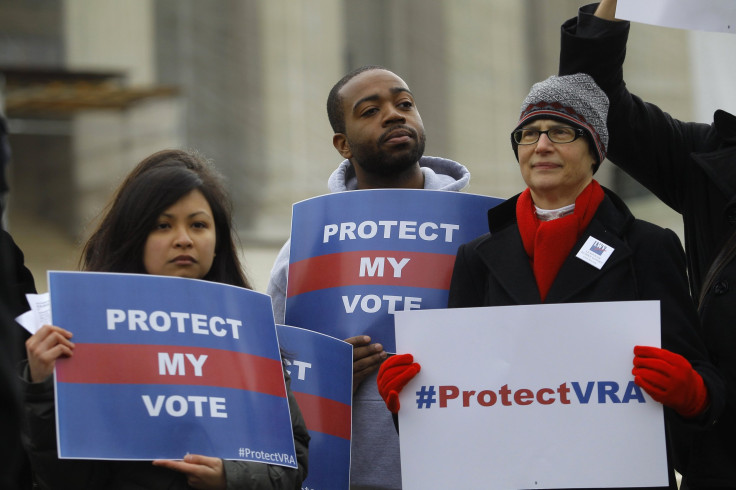
Five of the nine states previously under Section 4 of the Voting Rights Act have begun to mobilize following not more than 24 hours after the Supreme Court voted Tuesday to cut the provision out of the books. Section 4 required a section of states with a history of discriminatory voting practices to submit to "pre-clearance," requiring courts to overlook any voting bill that could adversely affect minority voters, PBS Frontline reported.
The provision was passed in 1965, an era when states primarily in the Deep South went through extravagant measures to prevent blacks from voting. Supporters of the gutting of the bill said it is up to Congress to continue the fight now, alleging that racism is no longer a concern great enough to warrant pre-clearance. The federal argument supported the decision, stating that laws can always be challenged all the way up to the Supreme Court.
"Early attempts to cope with this vile infection resembled battling the Hydra," Justice Ruth Bader Ginsburg said in her dissent of the ruling. "Whenever one form of voting discrimination was identified and prohibited, others sprang up in its place. This Court repeatedly encountered the remarkable 'variety and persistence' of laws disenfranchising minority citizens."
Forty-one states have pushed for restrictive voting legislation since last year, with 18 of the measures actually passing. The most common of laws are voter ID laws, which supporters say intend to prevent fraud. Statistics show, however, that voter fraud is a rare phenomenon. Opponents of Section 4, such as Arizona Attorney General Tom Horne called it "humiliating" to have to ask the courts for permission to pass laws.
In Texas, what is considered the strictest voter ID law in the country is currently in the works following the decision. The law was previously blocked in 2012. It would require residents to have various forms of ID in order to vote, including some that are typically too expensive for low-income families to afford. One of the required documents would be a passport, with the cheapest of the bunch going for $55. In leiu of a passport, voters may have a copy of their birth certificate, a document not all Americans possess, especially the elderly.
RELATED: Voting Rights Act Of 1965 'Gutted' By Supreme Court: How Will The Decision Affect Latino And Other Minority Voters?
The Justice Department blocked laws in South Carolina, Alabama, Mississippi and Virginia within the last two years. In South Carolina, a law authored in 2011 was struck down in 2012. It required voters to provide an exemption if they could not provide sufficient ID. Alabama's voter ID law never went through pre-clearance and now with the provision out of the way, it no longer has to. It passed in 2011 and will take effect in 2014. Mississippi passed a law in 2012 requiring voters to show ID starting in 2014. It was waiting on pre-clearance from the Justice Department. It plans to move forward with its passage following the decision.
Mississippi, however, has since joined the likes of North Carolina, California and New York in support of the Voting Rights Act. It and the other states argue that the law promotes transparency and is able to tackle issues of discriminatory voting practices more easily.
"It serves a powerful deterrent function that case-by-case litigation would not provide," a brief from the four states read.
© 2025 Latin Times. All rights reserved. Do not reproduce without permission.




